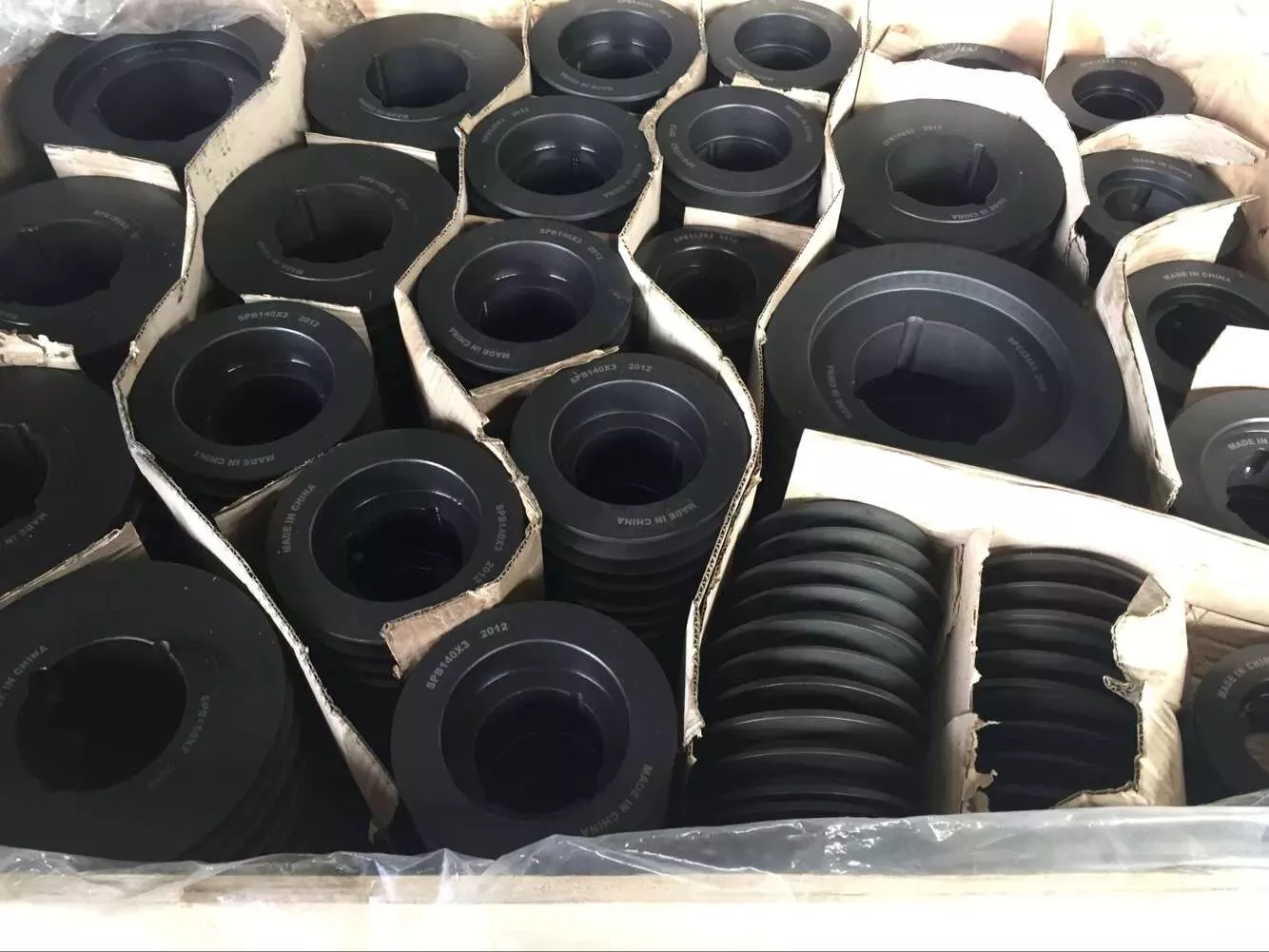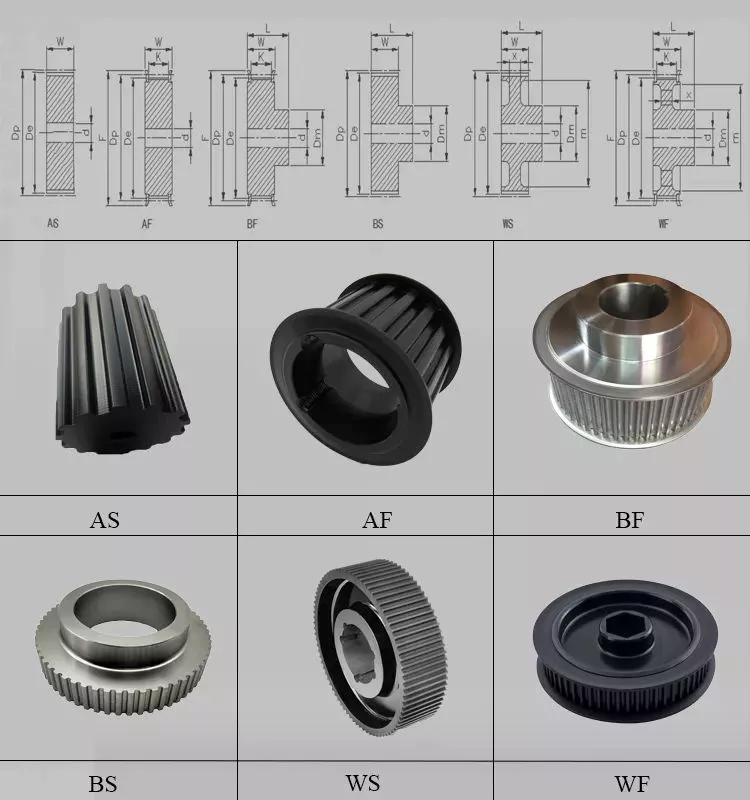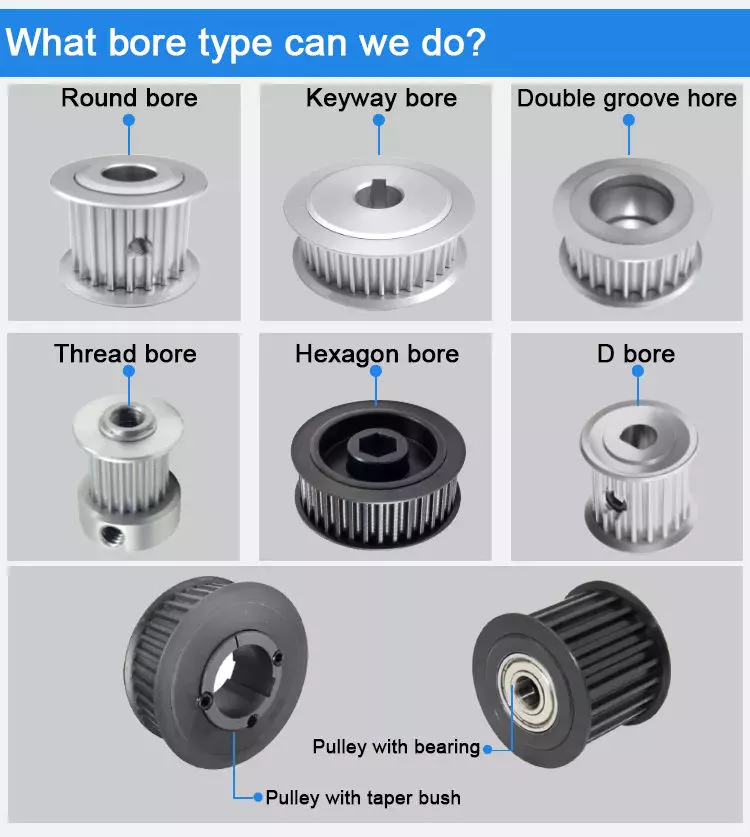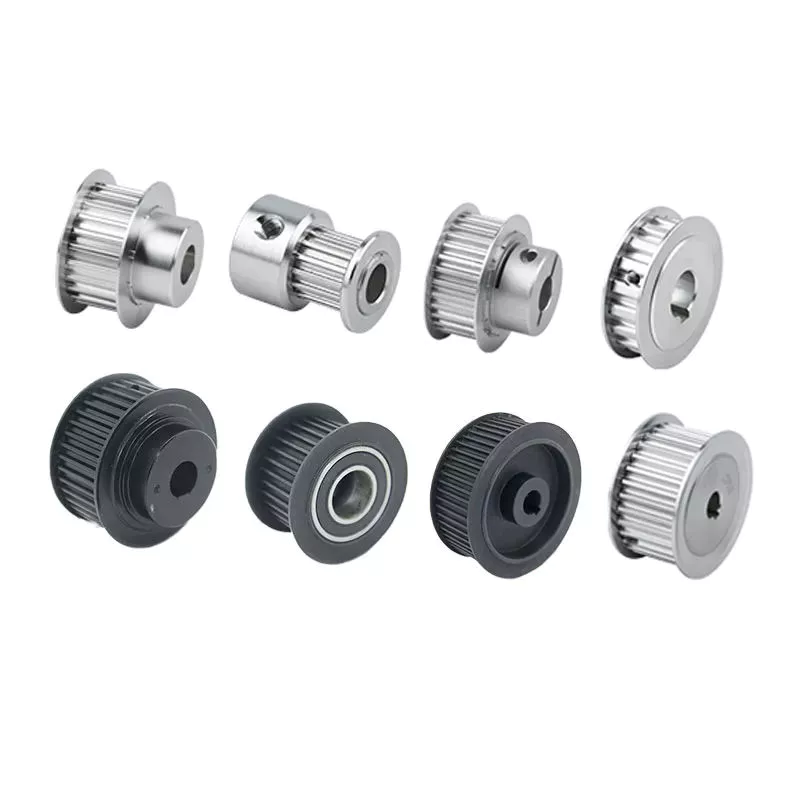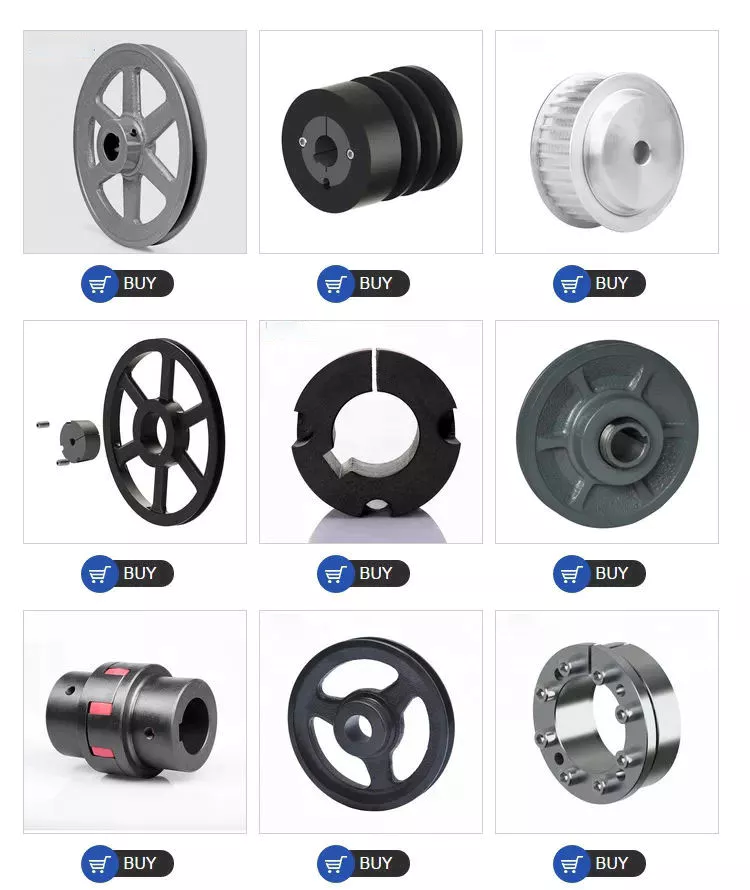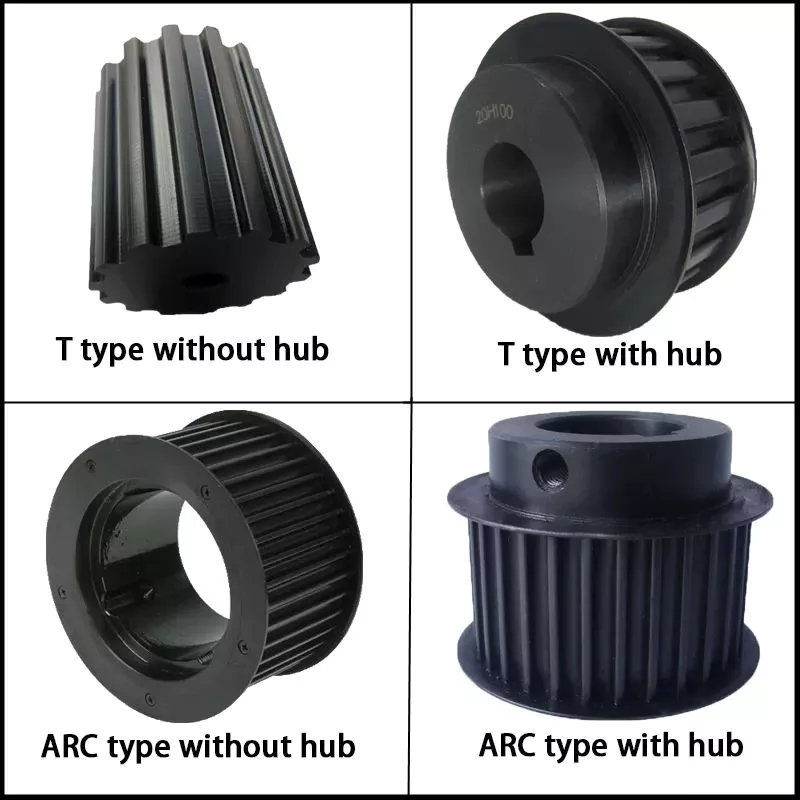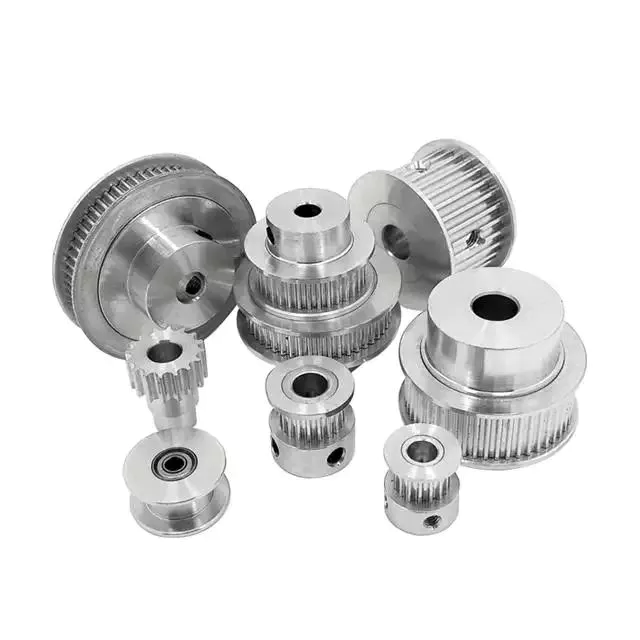Product Description
European Standard SPA CHINAMFG SPC SPZ Cast Iron Taper V Belt Pulley With Taper Bush
We can supply SPZ SPA CHINAMFG SPC V Belt Pulley with Taper Bush,V pulley, v belt pulley, v groove pulley, v groove belt pulley, taper lock pulley, taper lock v belt pulley, taper lock bushing pulley, taper lock pulleys / taper bore pulley, large v belt pulley, double v belt pulley, cast iron v belt pulley belt pulley, variable speed v belt pulleys, v belt pulley split pulley, cast iron v belt pulley
V belt pulley specifications:
1) European standard:
A) V-belt pulleys for taper bushings: SPZ, SPA, SPB, SPC; Up to 10 grooves
B) Adjustable speed V-belt pulleys and variable speed pulleys
C) Flat belt pulleys and conveyor belt pulleys
2) American standard:
A) Sheaves for taper bushings: 3V, 5V, 8V
B) Sheaves for QD bushings: 3V, 5V, 8V
C) Sheaves for split taper bushings: 3V, 5V, 8V
D) Sheaves for 3L, 4L or A, and 5L or B belts: AK, AKH, 2AK, 2AKH, BK, BKH, 2BK, 2BKH, 3BK
E) Adjustable sheaves: Poly V-pulley, multi-pitch H, L, J, K and M
3) Bore: Pilot bore, finished bore, taper bore, bore for QD bushing
4) Surface finish: Paint, phosphating, zinc plated
5) Material: Cast iron, ductile iron, nylon, aluminum
6) Made according to drawings and/or samples, OEM inquiries welcomed
|
Description |
P |
O |
Grooves |
N |
L |
D |
B |
Type |
d |
| SPA40 | 40 |
45.5 |
1 |
40 |
35 |
|
20 |
1 |
10 |
|
SPA50 |
50 |
55.5 |
1 2 |
40 40 |
35 45 |
|
20 35 |
1 1 |
10 10 |
|
SPA60 |
60 |
65.5 |
1 2 3 |
40 40 |
35 45 |
|
20 35 50 |
1 1 7 |
10 10 10 |
|
SPA71 |
71 |
76.5 |
1 2 3 |
40 50 52 |
40 45 52 |
|
20 35 50 |
1 1 1 |
10 10 10 |
|
SPA75 |
75 |
80.5 |
1 2 3 4 5 |
40 50 |
40 45 |
|
20 35 50 65 80 |
1 1 7 7 7
|
10 10 10 10 10 |
|
SPA80 |
80 |
85.5 |
1 2 3 4 5 |
45 50 |
40 45 |
|
20 35 50 65 80 |
1 1 7 7 7 |
10 10 15 15 15 |
|
SPA85 |
85 |
90.5 |
1 2 3 4 5 |
45 50 |
40 45 |
|
20 35 50 65 80 |
1 1 7 7 7 |
10 10 15 15 15 |
|
SPA90 |
90 |
95.5 |
1 2 3 4 5 |
45 60 |
40 45 |
|
20 35 50 65 80 |
1 1 7 7 7 |
10 15 15 15 15 |
|
SPA95 |
95 |
100.5 |
1 2 3 4 5 |
45 60 |
40 45 |
|
20 35 50 65 80 |
1 1 7 7 7 |
10 15 15 15 15 |
|
SPA100 |
100 |
105.5 |
1 2 3 4 5 |
48 60 |
40 45
52 52 |
67 67 |
20 35 50 65 80
|
1 1 7 7 7 |
10 15 15 15 15 |
|
SPA106 |
106 |
111.5 |
1 2 |
48 60 |
40 45 |
|
20 35 |
1 1 |
10 15 |
|
SPA112 |
112 |
117.5 |
1 2 3 4 5 |
48 60 |
40 45
52 52 |
79 79 |
20 35 60 65 80 |
1 1 7 2 2 |
10 15 15 15 15 |
|
SPA118 |
118 |
123.5 |
1 2 3 4 5 |
60 60 |
40 45
52 52 |
87 87 |
20 35 50 65 80 |
1 1 7 2 2 |
15 15 15 15 15 |
|
Description |
P |
O |
Grooves |
N |
L |
D |
B |
Type |
d |
|
SPB70 |
70 |
77 |
1 2 |
45 45 |
45 48 |
|
25 44 |
1 1 |
10 10 |
|
SPB80 |
80 |
87 |
1 2 3 4 5 |
50 50 |
45 48 |
|
25 44 63 82 101 |
1 1 7 7 7 |
10 10 15 15 15 |
|
SPB90 |
90 |
97 |
1 2 3 4 5 |
50 50 |
45 49 |
|
25 44 63 82 101 |
1 1 7 7 7 |
10 10 15 15 15 |
|
SPB100 |
100 |
107 |
1 2 3 4 5 |
52 55 |
45 55 |
|
25 44 63 82 101 |
1 1 7 7 7 |
10 15 15 15 15 |
|
SPB112 |
112 |
119 |
1 2 3 4 5 |
55 60 |
45 55 |
|
25 44 63 82 101 |
1 1 7 7 7 |
15 15 15 20 20 |
|
SPB120 |
120 |
127 |
1 2 3 4 5 6 |
55 60 |
45 55 |
|
25 44 63 82 101 120 |
1 1 7 7 7 7 |
15 15 15 20 20 20 |
|
SPB125 |
125 |
132 |
1 2 3 4 5 6 |
58 60 |
45 55 60 60 60 60 |
83 83 83 83 |
25 44 63 82 101 120 |
1 1 2 2 2 2 |
15 15 15 20 20 20 |
|
SPB132 |
132 |
139 |
1 2 3 4 5 6 |
60 60 |
45 55 60 60 60 60 |
88 88 88 88 |
25 44 63 82 101 120 |
1 1 2 2 2 2 |
15 15 15 20 20 20 |
|
SPB140 |
140 |
147 |
1 2 3 4 5 6 |
65 65 |
45 55 60 60 60 60 |
98 98 98 98 |
25 44 63 82 101 120 |
1 1 2 2 2 2 |
20 20 20 20 20 20 |
|
SPB150 |
150 |
157 |
1 2 3 4 5 6 |
65 65 |
45 55 60 60 60 60 |
108 108 108 108 |
25 44 63 82 101 120 |
1 1 2 2 2 2 |
20 20 20 20 20 20 |
|
Description |
P |
O |
Grooves |
N |
L |
D |
B |
Type |
d |
|
SPC100 |
100 |
109.6 |
1 |
60 |
50 |
|
34 |
1 |
15 |
|
SPC120 |
120 |
129.6 |
1 2 |
65 |
50 |
|
34 59.5 |
1 7 |
15 15 |
|
SPC140 |
140 |
149.6 |
1 2 3 4 |
70 |
50
65 80 |
83 83 |
34 59.5 85 110.5 |
1 7 2 2 |
20 20 20 20 |
|
SPC150 |
150 |
159.6 |
1 2 3 4 5 |
70
|
50
65 80 96 |
93 93 93 |
34 59.6 85 110.5 136 |
1 7 2 2 2 |
20 20 20 20 20 |
|
SPC160 |
160 |
169.6 |
1 2 3 4 5 6 |
72 |
50
65 80 96 96 |
103 103 103 103 |
34 59.5 85 110.5 136 161.5 |
1 7 2 2 2 2 |
20 20 20 20 20 20 |
|
SPC180 |
180 |
189.6 |
1 2 3 4 5 6 |
76 80 82 82 82 82 |
50 60 65 80 96 96 |
123 123 123 123 123 123 |
34 59.5 85 110.5 136 161.5 |
3 8 4 4 4 4 |
20 20 20 20 20 20 |
|
SPC200 |
200 |
209.6 |
1 2 3 4 5 6 |
76 80 86 90 90 90 |
50 60 65 90 100 100 |
143 143 143 143 143 143 |
34 59.5 85 110.5 136 161.5 |
3 3 4 4 4 4 |
20 20 20 20 25 25 |
|
SPC225 |
225 |
234.6 |
1 2 3 4 5 6 |
86 88 90 90 90 90 |
50 60 70 90 100 100 |
168 168 168 168 168 168 |
34 59.5 85 110.5 136 161.5 |
3 3 4 4 4 4 |
20 20 20 25 25 25 |
|
SPC250 |
250 |
259.6 |
1 2 3 4 5 6 |
86 92 92 100 102 102 |
50 60 70 90 100 100 |
193 193 193 193 193 193 |
34 59.5 85 110.5 136 161.5 |
3 3 4 4 4 4 |
20 20 20 25 25 25 |
|
SPC280 |
280 |
289.6 |
1 2 3 4 5 6 |
86 92 92 100 102 102 |
50 60 70 90 100 100 |
223 223 223 223 223 223 |
34 59.5 85 110.5 136 161.5 |
3 3 4 4 4 4 |
20 20 20 25 25 25 |
|
SPC300 |
300 |
309.6 |
1 2 3 4 5 6 |
86 92 92 100 104 104 |
50 60 70 90 100 100 |
243 243 243 243 243 243 |
34 59.5 85 110.5 136 161.5 |
3 3 4 4 4 4 |
20 20 20 25 25 25 |
HangZhou CHINAMFG Industry Co., Ltd. is a specialized supplier of a full range of chains, sprockets, gears, gear racks, v belt pulley, timing pulley, V-belts, couplings, machined parts and so on.
Due to our CHINAMFG in offering best service to our clients, understanding of your needs and overriding sense of responsibility toward filling ordering requirements, we have obtained the trust of buyers worldwide. Having accumulated precious experience in cooperating with foreign customers, our products are selling well in the American, European, South American and Asian markets.Our products are manufactured by modern computerized machinery and equipment. Meanwhile, our products are manufactured according to high quality standards, and complying with the international advanced standard criteria.
With many years’ experience in this line, we will be trusted by our advantages in competitive price, one-time delivery, prompt response, on-hand engineering support and good after-sales services.
Additionally, all our production procedures are in compliance with ISO9001 standards. We also can design and make non-standard products to meet customers’ special requirements. Quality and credit are the bases that make a corporation alive. We will provide best services and high quality products with all sincerity. If you need any information or samples, please contact us and you will have our soon reply.
| Certification: | CE |
|---|---|
| Pulley Sizes: | SPA Spb Spc Spz |
| Manufacturing Process: | Casting |
| Customization: |
Available
| Customized Request |
|---|
.shipping-cost-tm .tm-status-off{background: none;padding:0;color: #1470cc}
| Shipping Cost:
Estimated freight per unit. |
about shipping cost and estimated delivery time. |
|---|
| Payment Method: |
|
|---|---|
|
Initial Payment Full Payment |
| Currency: | US$ |
|---|
| Return&refunds: | You can apply for a refund up to 30 days after receipt of the products. |
|---|
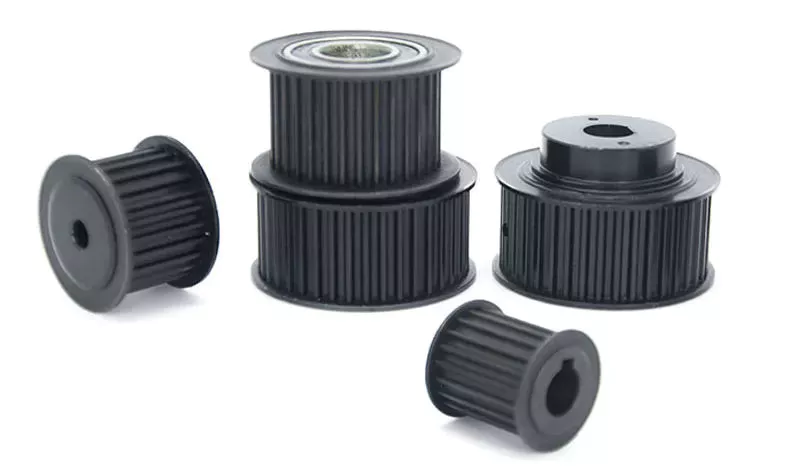
How do pulleys contribute to the operation of conveyor systems?
Pulleys play a critical role in the operation of conveyor systems by facilitating the movement of materials or products along the conveyor belt. Here’s how pulleys contribute to the functioning of conveyor systems:
1. Power Transmission: Conveyor systems typically utilize a motorized pulley, also known as a drive pulley or head pulley, which is connected to an electric motor. The motor rotates the drive pulley, which in turn moves the conveyor belt. The rotational power from the motor is transmitted to the belt through the drive pulley, enabling the continuous movement of the belt and the materials being conveyed.
2. Belt Tension and Tracking: Pulleys are used to maintain proper tension in the conveyor belt. Tension pulleys, also called idler pulleys, are strategically placed along the conveyor system to apply tension to the belt. These pulleys help to keep the belt taut and prevent slippage or sagging. Additionally, tracking pulleys are used to align the conveyor belt, ensuring it stays centered and runs smoothly along the intended path.
3. Load Support: Pulleys provide support for the conveyor belt and the load it carries. The belt wraps around the pulleys, and the load is distributed over the surface of the belt. Pulleys with larger diameters are often used at points where heavy loads are encountered to help distribute the load more effectively and prevent belt deformation or damage.
4. Directional Changes: Conveyor systems may require changes in direction to accommodate the layout or specific processing needs. Pulleys known as bend pulleys or snub pulleys are used to redirect the belt and change its course. These pulleys are designed to guide the belt smoothly around bends or corners without causing excessive stress or strain on the belt.
5. Speed Control: Pulleys can be utilized for speed control in conveyor systems. By using pulleys of different sizes or by employing variable speed drives, the rotational speed of the drive pulley can be adjusted, affecting the speed at which the conveyor belt moves. This allows for flexibility in the conveyance process, accommodating different material flow rates or specific operational requirements.
6. System Support and Stability: Pulleys, along with their associated support structures, provide stability to the conveyor system. They help to maintain the alignment and tension of the belt, preventing misalignment, vibrations, and excessive belt movement. Properly designed and maintained pulleys contribute to the overall reliability and smooth operation of the conveyor system.
Conveyor systems are widely used in industries such as manufacturing, mining, logistics, and warehousing. Pulleys are essential components that ensure the efficient and reliable movement of materials and products along the conveyor belt, enabling automated and continuous material handling processes.
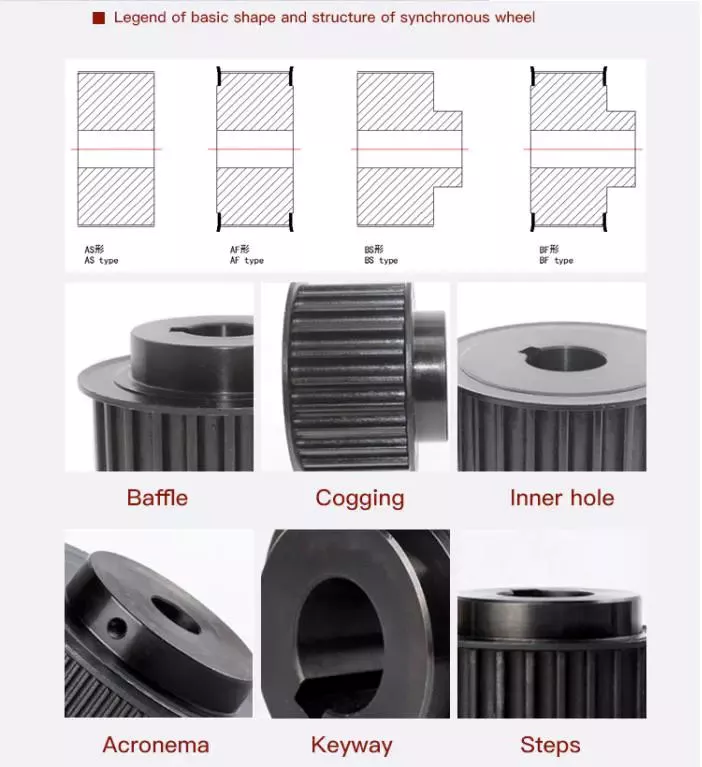
What is the role of pulleys in the mining and construction industries?
Pulleys play a vital role in the mining and construction industries, where they are utilized in various applications to facilitate heavy-duty operations, enhance safety, and improve efficiency. Here’s an overview of the role of pulleys in these industries:
1. Conveyor Systems:
In mining and construction, conveyor systems are extensively used to transport bulk materials, such as ores, rocks, gravel, and construction aggregates. Pulleys are integral components of conveyor systems, guiding and supporting the conveyor belts or chains. They help in maintaining tension, reducing friction, and ensuring smooth movement of materials over long distances. The pulleys used in these systems are designed to withstand high loads and harsh environmental conditions.
2. Hoisting and Lifting Equipment:
Pulleys are crucial in hoisting and lifting equipment used in mining and construction activities. Cranes, winches, and lifting systems often incorporate pulley arrangements to provide mechanical advantage and control the movement of heavy loads. The pulleys, along with ropes, cables, or chains, allow for safe and efficient lifting, lowering, and positioning of equipment, materials, and structures at construction sites or in mining operations.
3. Wire Rope Systems:
In mining and construction, wire ropes are extensively used for various applications, including hauling, towing, and lifting heavy loads. Pulleys, known as sheaves, are employed in wire rope systems to guide and redirect the wire ropes. The sheaves help in maintaining proper alignment, reducing wear, and ensuring efficient power transmission. They are commonly used in applications such as cranes, elevators, and wire rope hoists.
4. Crushing and Screening Equipment:
In the mining and construction industries, pulleys are used in crushing and screening equipment. For example, in crushers, pulleys are utilized to drive the rotating motion of the crusher’s jaws or cones, enabling the crushing of large rocks or ores into smaller sizes. Pulleys also play a role in vibrating screens, helping to generate the necessary vibrations that separate and classify materials based on size.
5. Earthmoving and Excavation Equipment:
Pulleys are incorporated into earthmoving and excavation equipment in mining and construction applications. For instance, in excavators or dragline machines, pulleys are used in the cable systems that control the movement of the bucket or shovel. The pulleys help in extending or retracting the cables, allowing for efficient excavation, loading, and material handling.
6. Tensioning and Alignment:
In mining and construction operations, pulleys are utilized for tensioning and alignment purposes. Tensioning pulleys ensure proper tensioning of belts, ropes, or cables, optimizing power transmission and preventing slippage. Alignment pulleys are employed to maintain the correct alignment of belts or chains, reducing wear, minimizing vibrations, and extending the lifespan of the components.
In summary, pulleys play a critical role in the mining and construction industries, contributing to material handling, lifting and hoisting operations, wire rope systems, crushing and screening equipment, earthmoving and excavation machinery, and tensioning and alignment applications. Their use enhances safety, improves efficiency, and enables the execution of heavy-duty tasks in these demanding industries.
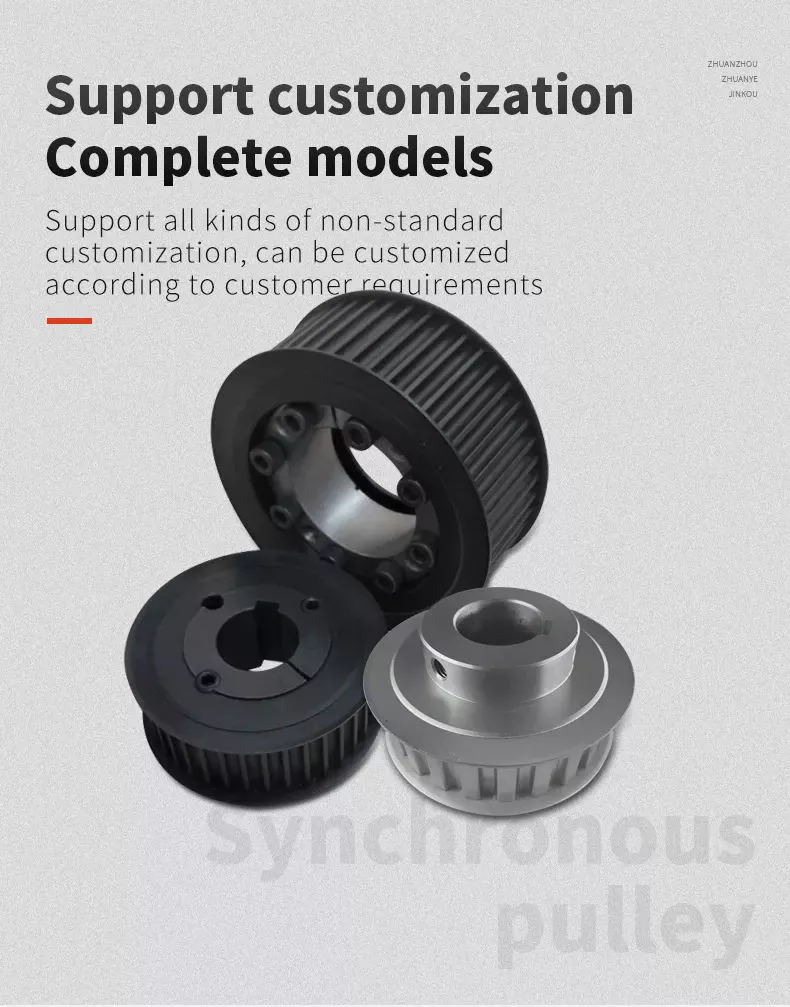
In which industries are pulleys extensively used?
Pulleys are extensively used in various industries for a wide range of applications. Here are some of the industries where pulleys find extensive use:
1. Manufacturing and Industrial: Pulleys are widely used in manufacturing and industrial settings. They are employed in conveyor systems for material handling, assembly lines, and production processes. Pulleys are also utilized in machinery and equipment such as pumps, compressors, generators, and conveyors. These industries rely on pulley systems for efficient movement of materials, power transmission, and mechanical advantage.
2. Construction and Engineering: The construction and engineering industries heavily rely on pulleys for lifting and moving heavy loads. Cranes, hoists, and winches utilize pulley systems to provide mechanical advantage and precise control over lifting operations. Pulleys are also employed in scaffolding systems, elevators, and material handling equipment used in construction projects.
3. Mining and Quarrying: In mining and quarrying operations, pulleys are used in various applications. They are utilized in conveyor systems to transport bulk materials such as coal, ore, and aggregates. Pulleys play a crucial role in mining equipment such as crushers, screens, and excavators, enabling efficient material handling and processing.
4. Transportation and Logistics: The transportation and logistics industries utilize pulleys in various ways. Pulleys are integral components in vehicles, including cars, trucks, buses, and trains. They are used in engines, power steering systems, alternators, and air conditioning systems. In logistics, pulleys are employed in conveyor belts and sorting systems for efficient movement of packages and goods in warehouses and distribution centers.
5. Agriculture and Farming: Pulleys have significant applications in the agriculture and farming sectors. They are used in machinery such as tractors, combines, and harvesters for power transmission and drive systems. Pulleys are also utilized in irrigation systems, grain elevators, and feed processing equipment.
6. Marine and Offshore: Pulleys find extensive use in marine and offshore industries. They are employed in shipbuilding, offshore drilling rigs, and maritime equipment. Pulleys are used in winches, cranes, anchor systems, and rigging applications. They enable safe and efficient lifting, lowering, and positioning of heavy equipment and cargo on ships and offshore platforms.
7. Energy and Utilities: The energy and utilities sectors utilize pulleys in power generation and transmission systems. Pulleys are used in turbines, generators, and power plants to transfer rotational motion and transmit power. They are also employed in renewable energy systems such as wind turbines and hydroelectric plants.
8. Entertainment and Stage Production: Pulleys have applications in the entertainment and stage production industries. They are used in theater rigging systems, concert stages, and amusement park rides. Pulleys enable the controlled movement of scenery, lighting equipment, and performers, ensuring smooth and precise operations.
These are just a few examples of the industries where pulleys are extensively used. Pulleys play a crucial role in a wide range of applications, providing mechanical advantage, power transmission, and efficient movement of loads in numerous industrial sectors.


editor by CX
2023-10-20
